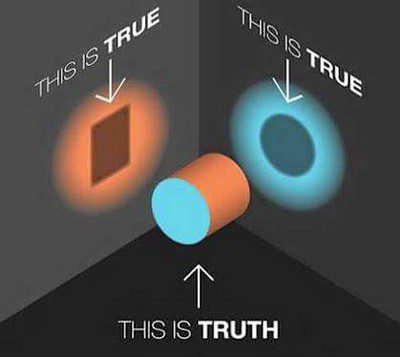In recent years, the phrase “my truth” has become a prominent part of social discourse, especially in discussions surrounding identity, personal experience, and subjective perspectives. What is the meaning of “my truth”? And what are its implications in shaping individual perspectives and communicating the biblical message?
What is “My Truth”?
I’ll attempt first to explain what people mean with they say, “my truth.”
“My truth” refers to a person’s subjective understanding of their experience and emotions. Those who use this phrase know that all perspectives are shaped by our unique backgrounds, values, and experiences. Its increased usage is due to a collective effort to acknowledge and respect the diversity of personal experiences and interpretations.
At the same time, “my truth” is a postmodern challenge to the claim that absolute or universal truth exists. Truth is multidimensional. Our perception of truth is contextual, often biased, and influenced by individual perceptions. The phrase “my truth” accentuates the importance of embracing diverse perspectives and questioning traditional or “authoritative” accounts of the world.
As a result, asserting “my truth” is a way that individuals affirm their autonomy and take ownership of their experiences. It encourages self-expression without the fear that others will judge or reject the speaker.
One hears claims of “my truth” quite frequently in conversations that concern marginalized communities. After all, individuals from different social and cultural backgrounds have unique perspectives that shape their identities. “My truth” buttresses against attempts by the majority culture to stifle or silence marginalized voices. Those who use the phrase hope to cultivate a sense of empathy and open-mindedness towards diverse people within their community.
What is the Problem?
The underlying goals that motivate people to speak of “my truth” are praiseworthy. However, ends don’t justify means, especially when it comes to truth. Here are a few problems that Christ’s followers should keep in mind before adopting vernacular ways of talking about truth.
First, the phrase “my truth” implies that truth is subjective, differing from person to person. By definition, however, truth refers to something that corresponds to reality or facts, regardless of personal opinion or belief. Subjective experiences differ from interpretations of truth, which often disagree with objective truth (i.e., verifiable truth that can be supported with evidence).
What people actually mean by “my truth” is simply their understanding of truth.
Using phrases like “my truth” either reflects or reinforces the idea that truth is relative. Relativism, in the sense I’m using it, asserts that what is true depends on personal perspective or cultural context. Such thinking allows for direct contradictions. Naturally, relativism is an assault on objective truth and undermines both critical thinking and evidence-based reasoning.
Without objective truth, we have little hope that people of varied backgrounds can have profitable dialogue. After all, if everyone’s “truth” is equally valid, how do we evaluate conflicting truth claims and solve serious disagreements? A “my truth” mentality ignores scientific research, expert opinions, and reliable sources of information.
We certainly see the negative fruit of “my truth” thinking in our divisive age of social media and “fake news.” We slowly begin to disregard information based solely on its source. We arrogantly assume that our tribe alone possesses the truth.

Being Humble About Truth
We need a lot of humility when talking about truth. Sadly, fear undercuts humility.
Some Christians often are so scared of anything that resembles relativism that they refuse to see legitimate concerns of others who discern at least some sort of relative aspect of truth. Consequently, conservative-to-fundamentalist thinkers wind up espousing the absolute infallibility of their own interpretations.
I propose we internalize the following:
We all have a relative perspective on absolute truth.
Why do I like this formulation? First, it helps us not to confuse epistemology (study of knowledge) with metaphysics (study of reality). In other words, simply because we don’t know what is real or true does not mean that truth or reality doesn’t exist.
What else does this statement imply? It recognizes that no one has a complete grasp of the truth. At the same, it affirms that we can discern what is real. It takes experience, humility, community, and (often) training to grow in our capacity to have a greater perspective (though still relative) on absolute truth.
Emphasizing “my truth” rather than “the truth” invariably breeds tribalism. Increased polarization splinters society. We are left with a “us vs. them” mentality. As that grows, empathy vanishes. Love dies. Injustice takes root.
Phrases like “my truth” are far from harmless. Followers of Christ need to remain mindful that our words have the power to shape both our own thinking and that of others.














